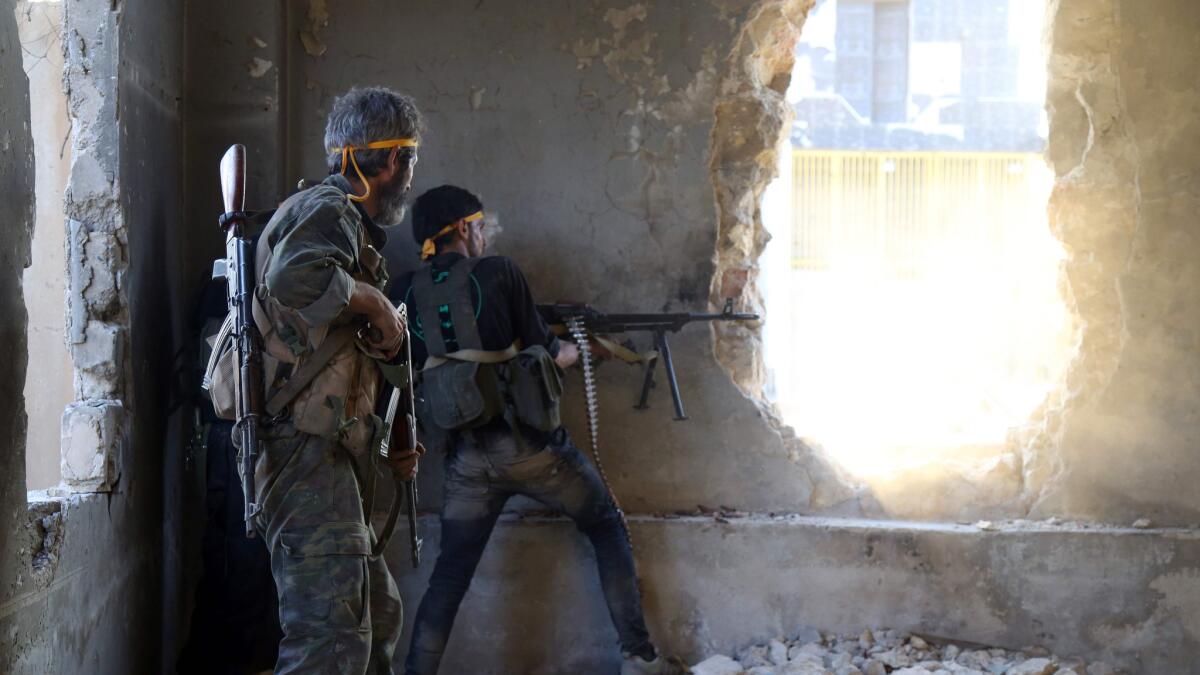Syrian rebels may be turning the tables on Assad’s troops in Aleppo

- Share via
Reporting from Beirut — Syrian rebels broke through a siege on opposition-held areas of Aleppo late Saturday night that government troops had been mounting for weeks, activists said.
Pro-government ground troops were forced to withdraw under a massive rebel onslaught from two sides. Hours later, they launched attacks on rebel positions in a bid to retake a complex of military academies south of Aleppo, according to state media.
Aleppo, Syria’s one-time industrial heart, has become a city divided between forces loyal to Syrian President Bashar Assad and the armed opposition rebels pitted against him.
Syrian warplanes and artillery units continued to barrage the area heavily on Sunday, according to the combat media division of Hezbollah, the Lebanese Shiite militant group that is allied with the government.
Opposition activists reported dozens of airstrikes on eastern neighborhoods of the city as well as rebel supply lines emanating from the northwestern province of Idlib.
In late July, a wide array of opposition factions, spearheaded by former Al Qaeda affiliate the Front for the Conquest of Syria and the ultraconservative Ahrar Al-Sham movement, launched a counter-offensive to lift the government’s siege. The groups mobilized an estimated 6,000 militants for the task, according to activists.
The campaign culminated in a breakthrough Saturday when rebel factions launched a series of suicide attacks and punched through the Ramousseh neighborhood, linking up with other opposition militants from inside the city.
“The two armies have met, the army of God from the outside and the army of God from the inside,” cheered one rebel who identified himself as Major Yasser al-Ghazaal in a YouTube video uploaded Sunday.
Other activists also posted images of what was said to be the first aid delivery into opposition-controlled areas. But only small amounts could make it through, according to Usama Taljo, a member of the opposition-affiliated Local Council of Aleppo.
“It’s difficult to bring in large amounts of aid. There are too many airstrikes by Russian and regime warplanes,” he said in a message on social media.
Dr. Dhaher Zaidan, a physician with the Doctor’s Union based in Aleppo, agreed.
“The way into Aleppo is still a military one. Whoever wants to take the risk can leave, but the road is not for civilians,” he said in a phone interview on Sunday.
Yet the opposition pressed its advantage on Sunday, pushing its forces to the southwestern entrance of Aleppo in what was seen as an attempt to widen the corridor.
If successful, it could turn the tables on the government and impose a siege on the western, government-held part of Aleppo, home to an estimated 1.2 million people.
Residents contacted inside government-held areas dismissed concerns of a siege, despite reports of some vendors withholding merchandise in stores.
See the most-read stories in World News this hour >>
“People can still come in and out of Aleppo,” said activist Hussein Mostapha Nashab in an interview on social media, referring to another road emanating from northern neighborhoods that remained out of rebel hands.
Another resident, who refused to be named for reasons of privacy, insisted that bus service on the government side of the city had not been disrupted.
Nevertheless, rebels fighting under the umbrella of Aleppo Conquest insisted in a statement to residents on the government side that “whoever enters his home is safe, whoever enters a mosque or a church is safe, and whoever [lays] down his weapon is safe too.” They added that anyone fleeing from government-held areas would be protected and secured, “regardless of his or her affiliation or background.”
“Our heroic revolutionaries are seekers of freedom, not bloodthirsty killers. They are also advocates for mercy, not tyrants.”
Yet it was residents of government-controlled areas of the city who bore the brunt of the onslaught. According to the pro-opposition monitor the Syrian Observatory for Human Rights, 130 people had been killed since the start of the counter-offensive July 30, mostly from shelling on western parts of the city.
Observers also pointed out that Islamic militants, who led the push that finally broke the siege, had vowed to execute any Alawites they encountered.
Alawites are members of the heterodox mountainous sect of which Assad is a part.
“Under the feet of the mujahideen we will kill the Alawites,” said one fighter in a video uploaded by Jabhat Fateh al-Sham on Friday.
“We will drag their bodies and mutilate them like they did to the Sunni people.”
Bulos is a special correspondent.
MORE WORLD NEWS
Chinese activist charged with ‘subversion’ for attending a meeting and a conference
Olympics security: What Brazil had to learn about terrorism
More to Read
Sign up for Essential California
The most important California stories and recommendations in your inbox every morning.
You may occasionally receive promotional content from the Los Angeles Times.











